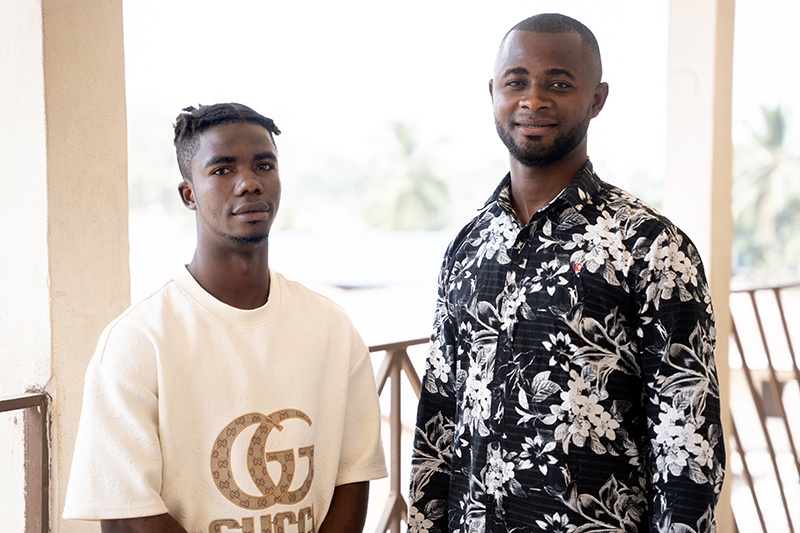Hospital Visitor to PIHer: Transforming Care in Sierra Leone
In 2012, Richard saw first-hand the challenges facing health services at Koidu Government Hospital. Today, he works at Partners In Health Sierra Leone, ensuring others receive better care.
Posted on Apr 7, 2025

When Richard Ellie visited his brother at Koidu Government Hospital (KGH) in 2012, he found him in distressing conditions. Throughout the facility, mosquitoes and a pungent odor filled the halls. Recovering from appendix surgery, 12-year-old David Ellie spent several days in a room without electricity, bedding, or running water.
It’s an experience the brothers would never forget—one that shaped Richard’s career path.
“I was angry about the fact that the hospital was not decent. There were not enough staff. It was not clean,” Richard reflects. “I was inspired to go do something ... and give back to the community.”
KGH had long struggled due to its location in Kono District, a diamond-rich region heavily impacted by the country’s decade-long civil war. Rebel forces exploited the area’s resources to fund their war, leaving the hospital severely under-resourced, with shortages of medical staff, supplies, and equipment.
Two years later, in 2014, the region faced new hardship during an Ebola epidemic. It was then that Partners In Health (PIH) responded to Sierra Leone’s Ministry of Health’s invitation to support the fight against Ebola. KGH was still standing, but like many facilities across the country, it lacked critical investment and resources, as the Ellie brothers had witnessed firsthand.
PIH has remained ever since, working in close partnership with Sierra Leone’s government and local communities to strengthen the health system and transform care at KGH.
Pursuing Public Health, PIH
The Ellie family has lived in rural Kono District for generations. Some relatives leave to study elsewhere, says Richard, but they always return to Kono.
Richard was one such family member. In 2018, he moved some 100 miles away from home to attend university. While there, he pursued various jobs—from commercial motor biking to cake decorating—to earn money to pay for school. Seeking work that aligned with his strengths and interests, he began teaching himself graphic design on his phone. Small business owners soon began hiring him to create marketing materials, helping him fund his education. He graduated with a bachelor’s degree in public health from Njala University in 2023.
Even after graduating, he continued honing his design skills while searching for jobs—always with the goal of moving back home. As fate would have it, he came across an advertisement for a full-time role as a graphic designer for PIH Sierra Leone. He applied, was hired, and returned home in October for his new job, where he now develops informative materials for patients at KGH, among other tasks.
Before long, he returned to the facility where his brother had been treated all those years ago—this time as a PIH staff member.
“The first day I went to KGH, I was really inspired,” says Richard. “I was really happy and I was smiling based on the impact I’ve seen PIH have in the hospital, the emergency ward ... Kono, and Sierra Leone at large.”
He reflected on how, at the time of David’s procedure, the hospital did not have a dedicated surgery ward, and patients often stayed for days due to limited staff and resources.
“To God be the glory, I was able to survive,” says David, now a professional event decorator who recently worked on the design for PIH Sierra Leone’s 10-year anniversary celebration dinner and also revisited KGH. “You can see the improved facilities. Undergoing surgery is no longer a threat like before,” he adds.

Today, patients who undergo the same procedure that David did in 2012 are typically discharged from KGH in less than 24 hours. There’s also a surgery ward, where 5,755 general surgeries for injuries, tumor removals, and other operations were performed from 2018-2024. This does not include C-sections, which totaled an additional 7,360 surgeries during that period.
These improvements have been made possible through long-term investment and collaboration. That includes hiring locally to provide culturally relevant care and stable job opportunities. In Sierra Leone, PIH employs more than 900 staff members, 94% of whom are Sierra Leonean nationals. The headcount will soon increase as PIH prepares to train the next generation of Sierra Leonean maternal health experts—doctors, nurses, and midwives—to serve women and children at the Maternal Center of Excellence (MCOE). The brand-new facility, currently under construction on the existing KGH campus, is set to open in January 2026.
MCOE: ‘We really need this’
During Richard’s onboarding to PIH, he went on a guided tour of the MCOE construction site. Walking around the facility, he learned how every detail was carefully developed to set a new standard for health care excellence—from its innovative design and infection control measures to dignified, patient-centered spaces.
“It is amazing this is happening. Are we really getting this? We really need this because so many lives would be saved here,” Richard thought to himself as he was flooded with emotions during the tour. “It was a mixture of being happy and being sad. I was sad for those that did not have the opportunity to get access to it. They lost a lot of things along the way. And happy for those that will have access to it when we finally open it.”
Excited about the future of health care in their hometown, Richard and David acknowledge the remarkable improvements made in the last decade.
Their mother is impressed, too. She recently called Richard—who was out of town for work—seeking advice about pain and fluid in her ear. He confidently referred her to KGH. During her visit, staff diagnosed the infection, thoroughly cleaned her ear, and gave her free medication. On a follow-up call with Richard, she noted how friendly the staff were to her and others—a stark difference from their experience during David’s surgery when resources were critically scarce.
“Since PIH came in, health care has become accessible and is improving every day,” says Richard. “Kono that used to be one of the places with the [worst] health care is becoming one of the hubs for good health in Sierra Leone.”

